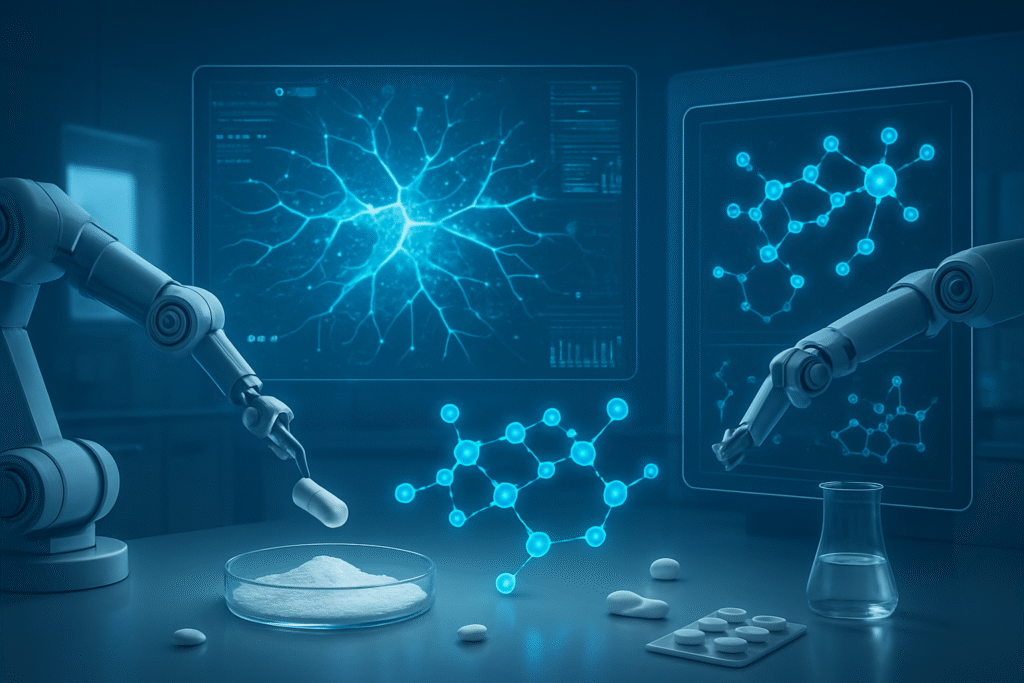
San Francisco, CA – October 31, 2025 – Artificial intelligence (AI) is ushering in a transformative era for the pharmaceutical industry, particularly in the often-overlooked yet critical domain of excipient development. These "inactive" ingredients, which constitute the bulk of most drug formulations, are now at the forefront of an AI-driven innovation wave. By leveraging advanced algorithms and vast datasets, AI is rapidly replacing traditional, time-consuming, and often empirical trial-and-error methods, leading to the creation of drug formulations that are not only more effective in their therapeutic action but also significantly safer for patient consumption. This paradigm shift promises to accelerate drug development, reduce costs, and enhance the precision with which life-saving medications are brought to market.
The immediate significance of AI's integration into excipient development cannot be overstated. It enables pharmaceutical companies to predict optimal excipient combinations, enhance drug solubility and bioavailability, improve stability, and even facilitate personalized medicine. By moving beyond conventional experimentation, AI provides unprecedented speed and predictive power, ensuring that new medications reach patients faster while maintaining the highest standards of efficacy and safety. This strategic application of AI is poised to redefine the very foundation of pharmaceutical formulation science, making drug development more scientific, efficient, and ultimately, more patient-centric.
The Technical Edge: AI's Precision in Formulation Science
The technical advancements driving AI in excipient development are rooted in sophisticated machine learning (ML), deep learning (DL), and increasingly, generative AI (GenAI) techniques. These methods offer a stark contrast to previous approaches, which relied heavily on laborious experimentation and established, often rigid, platform formulations.
Machine learning algorithms are primarily employed for predictive modeling and pattern recognition. For instance, ML models can analyze extensive datasets of thermodynamic parameters and molecular descriptors to forecast excipient-drug compatibility with over 90% accuracy. Algorithms like ExtraTrees classifiers and Random Forests, exemplified by tools such as Excipient Prediction Software (ExPreSo), predict the presence or absence of specific excipients in stable formulations based on drug substance sequence, protein structural properties, and target product profiles. Bayesian optimization further refines formulation by efficiently exploring high-dimensional spaces to identify optimal excipient combinations that enhance thermal stability, interface stability, and minimize surfactant use, all while significantly reducing the number of experimental runs compared to traditional statistical methods like Design of Experiments (DoE).
Deep learning, with its artificial neural networks (ANNs), excels at learning complex, hierarchical features from large datasets. ANNs can model intricate formulation behaviors and predict excipient compatibility with greater computational and predictive capability, identifying structural components responsible for incompatibilities. This is crucial for optimizing amorphous solid dispersions (ASDs) and self-emulsifying drug delivery systems (SEDDS) to improve bioavailability and dissolution. Furthermore, AI-powered molecular dynamics (MD) simulations refine force fields and train models to predict simulation outcomes, drastically speeding up traditionally time-consuming computations.
Generative AI marks a significant leap, moving beyond prediction to create novel excipient structures or formulation designs. Models like Generative Adversarial Networks (GANs) and Variational Autoencoders (VAEs) learn the fundamental rules of chemistry and biology from massive datasets. They can then generate entirely new molecular structures with desired properties, such as improved solubility, stability, or specific release profiles. This capability allows for the exploration of vast chemical spaces, expanding the possibilities for novel excipient discovery far beyond what traditional virtual screening of existing compounds could achieve.
Initial reactions from the AI research community and industry experts are largely optimistic, albeit with a recognition of ongoing challenges. While the transformative potential to revolutionize R&D, accelerate drug discovery, and streamline processes is widely acknowledged, concerns persist regarding data quality and availability, the "black box" nature of some AI algorithms, and the need for robust regulatory frameworks. The call for explainable AI (XAI) is growing louder to ensure transparency and trust in AI-driven decisions, especially in such a critical and regulated industry.
Corporate Chessboard: Beneficiaries and Disruption
The integration of AI into excipient development is fundamentally reshaping the competitive landscape for pharmaceutical companies, tech giants, and agile startups alike, creating both immense opportunities and significant disruptive potential.
Pharmaceutical giants stand to be major beneficiaries. Companies like Merck & Co. (NYSE: MRK), Novartis AG (NYSE: NVS), Pfizer Inc. (NYSE: PFE), Johnson & Johnson (NYSE: JNJ), AstraZeneca PLC (NASDAQ: AZN), AbbVie Inc. (NYSE: ABBV), Eli Lilly and Company (NYSE: LLY), Amgen Inc. (NASDAQ: AMGN), and Moderna, Inc. (NASDAQ: MRNA) are heavily investing in AI to accelerate R&D. By leveraging AI to predict excipient influence on drug properties, they can significantly reduce experimental testing, compress development timelines, and bring new drugs to market faster and more economically. Merck, for instance, uses an AI tool to predict compatible co-formers for co-crystallization, substantially shortening the formulation process.
Major AI labs and tech giants are strategically positioning themselves as indispensable partners. Companies such as Alphabet Inc. (NASDAQ: GOOGL), through its DeepMind and Isomorphic Labs divisions, and Microsoft Corporation (NASDAQ: MSFT), with its "Microsoft Discovery" initiatives, are investing heavily in "AI Science Factories." They are offering scalable AI platforms, computational power, and advanced algorithms that pharma companies can leverage. International Business Machines Corporation (NYSE: IBM), through its watsonx platform and AI Agents, is co-creating solutions for biologics design with partners like Moderna and Boehringer Ingelheim. These tech giants aim to become foundational technology providers, deeply integrating into the pharmaceutical value chain from target identification to formulation.
The startup ecosystem is also thriving, pushing the boundaries of AI in drug discovery and excipient innovation. Agile companies like Atomwise (with its AtomNet platform), Iktos (specializing in AI and robotics for drug design), Anima Biotech (mRNA Lightning.AI platform), Generate Biomedicines ("generative biology"), and Recursion Pharmaceuticals (AI-powered platform) are developing specialized AI tools for tasks like predicting excipient compatibility, optimizing formulation design, and forecasting stability profiles. Galixir (with its Pyxir® drug discovery platform) and Olio Labs (accelerating combination therapeutics discovery) are other notable players. These startups often focus on niche applications, offering innovative solutions that can rapidly address specific challenges in excipient development.
This AI-driven shift is causing significant disruption. It marks a fundamental move from empirical, trial-and-error methods to data-driven, predictive modeling, altering traditional formulation development pathways. The ability of AI to accelerate development and reduce costs across the entire drug lifecycle, including excipient selection, is reshaping competitive dynamics. Furthermore, the use of deep learning and generative models to design novel excipient molecular structures could disrupt the market for established excipient suppliers by introducing entirely new classes of inactive ingredients with superior functionalities. Companies that embrace this "pharma-tech hybrid" model, integrating technological prowess with pharmaceutical expertise, will gain a significant competitive advantage through enhanced efficiency, innovation, and data-driven insights.
Wider Horizons: Societal Impact and Ethical Crossroads
The integration of AI into excipient development is not an isolated technical advancement but a crucial facet of the broader AI revolution transforming the pharmaceutical industry and, by extension, society. By late 2025, AI is firmly established as a foundational technology, reshaping drug development and operational workflows, with 81% of organizations reportedly utilizing AI in at least one development program by 2024.
This trend aligns with the rise of generative AI, which is not just analyzing data but actively designing novel drug-like molecules and excipients, expanding the chemical space for potential therapeutics. It also supports the move towards data-centric approaches, leveraging vast multi-omic datasets, and is a cornerstone of predictive and precision medicine, which demands highly tailored drug formulations. The use of "digital twins" and in silico modeling further streamlines preclinical development, predicting drug safety and efficacy faster than traditional methods.
The overall impact on the pharmaceutical industry is profound: accelerated development, reduced costs, and enhanced precision leading to more effective drug delivery systems. AI optimizes manufacturing and quality control by identifying trends and variations in analytical data, anticipating contamination, stability, and regulatory deviations. For society, this translates to a more efficient and patient-centric healthcare landscape, with faster access to cures, improved treatment outcomes, and potentially lower drug costs due to reduced development expenses. AI's ability to predict drug toxicity and optimize formulations also promises safer medications for patients.
However, this transformative power comes with significant concerns. Ethically, algorithmic bias in training data could lead to less effective or harmful outcomes for specific patient populations if not carefully managed. The "black box" nature of complex AI algorithms, where decision-making processes are opaque, raises questions about trust, especially in critical areas like drug safety. Regulatory bodies face the challenge of keeping pace with rapid AI advancements, needing to develop robust frameworks for validating AI-generated data, ensuring data integrity, and establishing clear oversight for AI/ML in Good Manufacturing Practice (GMP) environments. Job displacement is another critical concern, as AI automates repetitive and even complex cognitive tasks, necessitating proactive strategies for workforce retraining and upskilling.
Compared to previous AI milestones, such as earlier computational chemistry or virtual screening tools, the current wave of AI in excipient development represents a fundamental paradigm shift. Earlier AI primarily focused on predicting properties or screening existing compounds. Today's generative AI can design entirely new drugs and novel excipients from scratch, transforming the process from prediction to creation. This is not merely an incremental improvement but a holistic transformation across the entire pharmaceutical value chain, from target identification and discovery to formulation, clinical trials, and manufacturing. Experts describe this growth as a "double exponential rate," positioning AI as a core competitive capability rather than just a specialized tool, moving from a "fairy tale" to the "holy grail" for innovation in the industry.
The Road Ahead: Innovations and Challenges on the Horizon
The future of AI in excipient development promises continued innovation, with both near-term and long-term developments poised to redefine pharmaceutical formulation science. Experts predict a significant acceleration in drug development timelines and substantially improved success rates in clinical trials.
In the near term (1-5 years), AI will become deeply embedded in core formulation operations. We can expect accelerated excipient screening and selection, with AI tools rapidly identifying optimal excipients based on desired characteristics and drug compatibility. Predictive models for formulation optimization, leveraging ML and neural networks, will model complex behaviors and forecast stability profiles, enabling real-time decision-making and multi-objective optimization. The convergence of AI with high-throughput screening and robotic systems will lead to automated optimization of formulation parameters and real-time design control. Specialized predictive software, like ExPreSo for biopharmaceutical formulations and Merck's AI tool for co-crystal prediction, will become more commonplace, significantly reducing the need for extensive wet-lab testing.
Looking further ahead (beyond 5 years), the role of AI will become even more transformative. Generative models are anticipated to design entirely novel excipient molecular structures from scratch, moving beyond optimizing existing materials to creating bespoke solutions for complex drug delivery challenges. The integration of quantum computing will allow for modeling even larger and more intricate molecular systems, enhancing the precision and accuracy of predictions. This will pave the way for truly personalized and precision formulations, tailored to individual patient needs and specific drug delivery systems. The concept of "digital twins" will extend to comprehensively simulate and optimize excipient performance and formulation processes, enabling continuous learning and refinement throughout the drug lifecycle. Furthermore, the integration of real-world data, including clinical trial results and patient outcomes, will further drive the precision of AI predictions.
On the horizon, potential applications include refined optimization of drug-excipient interactions to ensure stability and efficacy, enhanced solutions for poorly soluble molecules, and advanced drug delivery systems such as AI-designed nanoparticles for targeted drug delivery. AI will also merge with Quality by Design (QbD) principles and Process Analytical Technologies (PAT) to form the foundation of next-generation pharmaceutical development, enabling data-driven understanding and reducing reliance on experimental trials. Furthermore, AI-based technologies, particularly Natural Language Processing (NLP), will automate regulatory intelligence and compliance processes, helping pharmaceutical companies navigate evolving guidelines and submission requirements more efficiently.
Despite this immense potential, several challenges must be addressed. The primary hurdle remains data quality and availability; AI models are highly dependent on large quantities of relevant, high-quality, and standardized data, which is often fragmented within the industry. Model interpretability and transparency are critical for regulatory acceptance, demanding the development of explainable AI (XAI) techniques. Regulatory bodies face the ongoing challenge of developing robust, risk-based frameworks that can keep pace with rapid AI advancements. Significant investment in technology infrastructure and a skilled workforce, along with careful consideration of ethical implications like privacy and algorithmic bias, are also paramount. Experts predict that overcoming these challenges will accelerate drug development timelines, potentially reducing the overall process from over 10 years to just 3-6 years, and significantly improving success rates in clinical trials.
A New Frontier in Pharmaceutical Innovation
The advent of AI in excipient development represents a pivotal moment in the history of pharmaceutical innovation. It is a testament to the transformative power of artificial intelligence, moving the industry beyond traditional empirical methods to a future defined by precision, efficiency, and predictive insight. The key takeaways from this development are clear: AI is not just optimizing existing processes; it is fundamentally reshaping how drugs are formulated, leading to more effective, safer, and potentially more accessible medications for patients worldwide.
This development signifies a profound shift from a reactive, trial-and-error approach to a proactive, data-driven strategy. The ability to leverage machine learning, deep learning, and generative AI to predict complex interactions, optimize formulations, and even design novel excipients from scratch marks a new era. While challenges related to data quality, regulatory frameworks, and ethical considerations remain, the pharmaceutical industry's accelerating embrace of AI underscores its undeniable potential.
In the coming weeks and months, watch for continued strategic partnerships between tech giants and pharmaceutical companies, further advancements in explainable AI, and the emergence of more specialized AI-powered platforms designed to tackle specific formulation challenges. The regulatory landscape will also evolve, with agencies working to provide clearer guidance for AI-driven drug development. This is a dynamic and rapidly advancing field, and the innovations in excipient development powered by AI are just beginning to unfold, promising a healthier, more efficient future for global healthcare.
This content is intended for informational purposes only and represents analysis of current AI developments.
TokenRing AI delivers enterprise-grade solutions for multi-agent AI workflow orchestration, AI-powered development tools, and seamless remote collaboration platforms.
For more information, visit https://www.tokenring.ai/.





